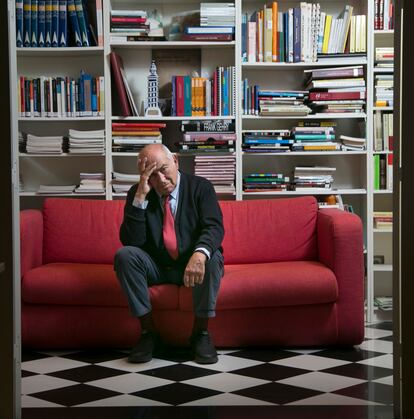Philosopher José Antonio Marina: ‘The fact that happiness has become fashionable is catastrophic’
In his new book, the writer gives an overview of history from the point of view of the desires and emotions that drive it


History, that great compilation of events with which we try to understand the past through angles, perspectives, documents, dates, wars, empires, alliances, betrayals and a succession of events that more often than not are reshaped by the pen of the victors, has today a novel, original approach: Spanish philosopher José Antonio Marina, 83, explores it through the lens of the emotions, desires and motivations that pervade the search for happiness in his new book El deseo interminable (The Endless Desire), where he addresses the feelings behind the acts that have shaped the story of the past.
Question. Is desire the main driving force of history?
Answer. It is the great driving force. All of history is driven by motivations.
Q. Even Hitler and Putin?
A. Actions are prompted by desires, passions and fears, that is, by the emotional world. Some people make decisions motivated by their specific desires, and when they include others, collective desires are produced. That gives rise to the movements of history. Putin, for example, decided to go to war with Ukraine motivated by a desire to exercise power, to protect his money, the greatness of Russia, to take revenge on the West... whatever, but it is a desire, and only afterward comes the reasoning. In his latest speech to justify the war, he roused among the Russian people the fear of the West, the need to recover Russia’s greatness and the mobilization he wanted. The reasoning itself does not mobilize; it needs to be connected to desires. We are talking about power, one of the great desires that intervene in history, and no one stays there only by force, they have to rouse the obedience of the subjects. The Nazi regime was based on obedience, too, as is now the Chinese.
Q. Is the West failing to get the moral high ground from its leaders to sustain the credibility of the system?
A. After a booming period in democracies, today we see a certain distrust, and that is the great failure of the Western world. That is why illiberal democracies are appearing, with strong leaders who push legality to the limit. It happened with Trump, Bolsonaro, Erdoğan, Putin, Orban, Kazynkski… suddenly they begin to be attractive within democracies. We Westerners are not recognizing the great achievements and there is an excessive distrust in the system that connects with the nostalgia for a strong leader. We only see China as an economic and technological power, when it turns out that it is a very strong ideological power that is proselytizing its model. We are so deeply obsessed with the economy that we don’t realize this, the extent to which Xi Jinping’s theoretical proposals are permeating.
Q. What is the problem of Westerners, from the point of view of emotions? We have plenty of reasons and arguments, but lack adherence to our model.
A. We have an excessively emotional political life, which generates great polarization. We have not managed, for example, to have an emotion related to the term “Europe,” or to “democracy.” We have failed there. And we easily return to the ancestral. The emotional centers are very deep in the brain and change very slowly. On the other hand, the cognitive centers are in the cortex, and they do so very quickly. For this reason, we can change our ideas very quickly but not our emotions, and the oldest ones strive to emerge. This is why wars always work the same way: I want to destroy you, I suffer and I want revenge. They are very old emotions that emerge when cognitive control disappears. Today, the streams of people fleeing from Kherson have cellphones, but they are fleeing exactly the same as always. Our emotional systems do not change, we are stuck in primitivism.
Q. Why are we so polarized?
A. For the same reason that the importance of identity has increased. One of the oldest emotions of humanity has to do with belonging to the group. In a globalized world, this starts to fade away, which generates fear. People want to identify with their group again. One of the ways for a group to come together is to oppose another.
Q. The external enemy.
A. All the confrontation of ideologies that takes place today is confirmation. That is what Putin has done with the West: we are the bad guys. Cohesion can be found in the eternal values, everything else is dangerous. And if you look for an enemy, you strengthen the group. The other does the same. The conservative and the progressive natures are inherited, a lot has been written about it, but in the conservative there is a physiological component, it prefers to avoid punishment, and therefore risk. It wants to return to safety. Meanwhile, the progressive prefers to get the prize, it takes risks, innovates. The problem is: who’s in the middle? A center demands to always assess different behaviors, and that is the least comfortable option.
Q. What are the big emotions of today?
A. Those of today, yesterday and always are the same and are universal: grief, joy, anger, fear and disgust. They are from everywhere, and from there the different cultures create variations or more complex feelings. And today, the most widespread is fear. Fear and the feeling of identity.
Q. Is our model of precariousness not causing detachment?
A. Yes, in some groups, and adherence in others. New technologies provide filter bubbles, so we can interact only with those we want: gays, trans, Catholics, lesbians... We are globalized and developed in some things and returning to localism in others. And that often produces disruption.
Q. Have we not progressed?
A. We live longer, diseases are better controlled, fewer mothers and children die in childbirth, there is less hunger compared to the past, there is more schooling. But terrible collapses occur and everything falls apart. In the last century, two world wars, genocides beginning in Armenia and ending in Rwanda, huge famines with millions of deaths like the one in Ukraine, caused by Stalin, and the one in China, the raping of women as a weapon of war that we are seeing again... we have a kind of moral facade and the moment it cracks, a scary character emerges.
Q. Is ethical collapse possible today?
A. Yes, it is possible. It happened not so long ago in the most educated, the most technologically and scientifically advanced nation: Germany. The people who killed five million Jews were not mentally ill. They were ordinary people who suddenly saw the entire legal and ethical structure disappear. And very dangerous emotions emerged. Some are dangerous and others are protective, like compassion.
Q. Marx defined happiness as a struggle, others as well-being. How can the search for happiness be turned into something beneficial for the community?
A. There are two types of happiness: lowercase and uppercase. But since the 18th century we have become aware of another kind, a social, public happiness, the only one in which we can agree, which leads us to ask: in what model do we want to live? Do we want to be protected by law, or do we want force to prevail? To be compassionate or fierce? To rely on others or live isolated? Once I have that framework of rights and compassion, then I seek my private happiness. The idea of happiness is linked to the idea of justice, which is social happiness. I have to combine the two things and realize that isolated I have very few resources, I will be at the mercy of the most powerful, so I have to contribute to a framework of social happiness that protects me. And that is the dialectic that we forget all too easily. In Ukraine, for example, you cannot be happy because there is a framework of absolute public unhappiness that has been taking shape since the French Revolution with the welfare state. Herodotus used to say that when the king of Persia died, all laws were abolished for five days. People could kill, steal, rape. Why? So that they saw that they needed to be protected by laws. And we’ve forgotten that. The neoliberal or ultraliberal idea of a rule of law is that no one interferes with my rights because they will alter my freedom. They don’t know what they’re saying. You need others in order to fulfill your rights.
Q. Individualism and inequality prevail.
A. That is what makes it a very conflictive society. The fact that happiness has become fashionable is catastrophic, because everyone is being told to think about their psychological happiness and the relationship of happiness with justice, with ethics and with public happiness, is broken. It is a return to narcissism. The individual is being shut in their own happiness and breaking the bond with social happiness. The propositions of positive psychology are fiercely reactionary and unethical. We are in intellectual poverty and in an absolute collapse of critical thinking. Philosophy is in absolute crisis, thinking of aphorisms and trifles and spreading the idea from the American universities that we cannot disturb the students. And critical thinking is unsettling.
Q. What should we do?
A. We have to rearm ourselves, intellectually; we have a tremendous conceptual turmoil. There is a discredit of the truth from philosophy itself, because the truth cannot be reached; from religion, because the truth is revealed; from the politicians, because there are fake news; from universities, because the truth related to identity is not universal. That can end up tearing down great achievements such as democracy or ethics, which are based on universal truths. The critical thinking crisis is so brutal that we have to campaign to redeem the truth as something that can be achieved. The truth is difficult and people say: why am I going to make an effort if each one has their own? That in the end will only serve to validate the law of the strongest.
Tu suscripción se está usando en otro dispositivo
¿Quieres añadir otro usuario a tu suscripción?
Si continúas leyendo en este dispositivo, no se podrá leer en el otro.
FlechaTu suscripción se está usando en otro dispositivo y solo puedes acceder a EL PAÍS desde un dispositivo a la vez.
Si quieres compartir tu cuenta, cambia tu suscripción a la modalidad Premium, así podrás añadir otro usuario. Cada uno accederá con su propia cuenta de email, lo que os permitirá personalizar vuestra experiencia en EL PAÍS.
¿Tienes una suscripción de empresa? Accede aquí para contratar más cuentas.
En el caso de no saber quién está usando tu cuenta, te recomendamos cambiar tu contraseña aquí.
Si decides continuar compartiendo tu cuenta, este mensaje se mostrará en tu dispositivo y en el de la otra persona que está usando tu cuenta de forma indefinida, afectando a tu experiencia de lectura. Puedes consultar aquí los términos y condiciones de la suscripción digital.








































